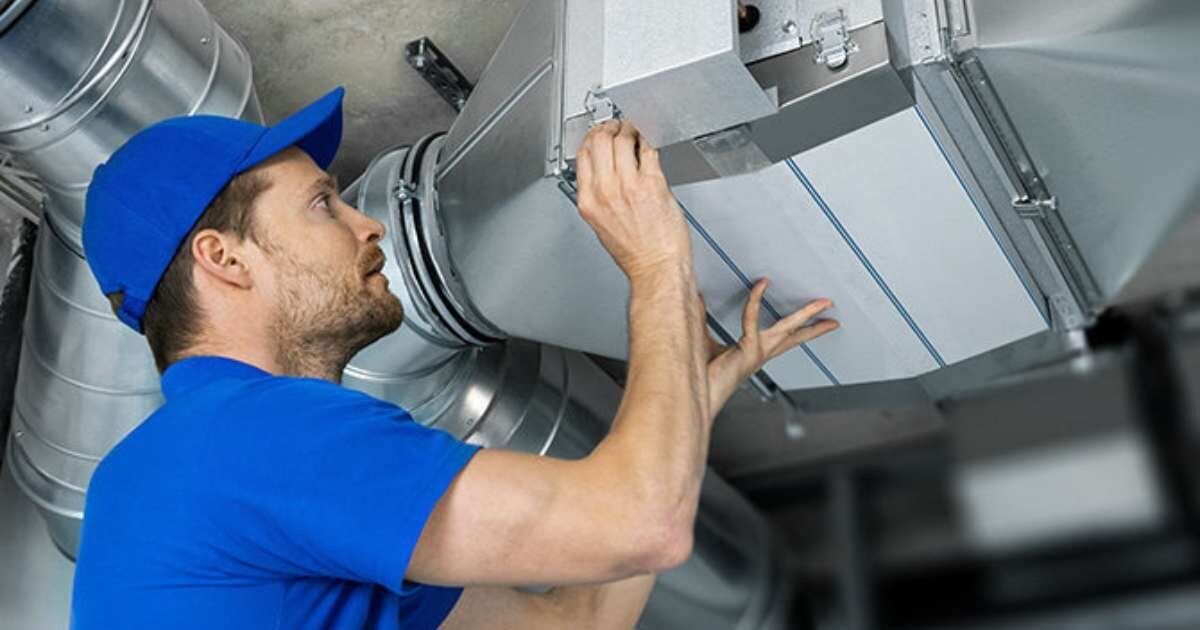
Have you ever wondered why some rooms in your home feel uncomfortably hot, while others remain perfectly cool? Here’s the simple answer: uneven air conditioning.
Uneven air conditioning is a common issue homeowners face, especially during the summer. However, it’s more than just being uncomfortable – having uneven air conditioning can also increase your energy bill.
But we have good news, Advance Heating and Cooling specializes in discovering and resolving problems just like these, ensuring every room in your house is cool.
Join us as we look at the most common causes of uneven air conditioning and how our experts at Advance Heating and Cooling can help.
Uneven cooling in your home can have multiple contributing factors, each impacting your comfort and utility bill. Let’s identify these issues, discover the solutions, and determine when it’s time to consult an expert:
Large windows can be aesthetically appealing but can also come with problems. Windows that face the sun absorb more heat during the day. The sun can overpower your AC, causing certain rooms to be warmer than others.
Using blinds or heavy curtains can minimize sunlight. If you want to enjoy the natural light, we can provide a more permanent solution by installing solar films or energy-efficient windows.
Old and poorly maintained ducts can cause leaks or blockages, restricting airflow to certain areas of your home. Inspecting ducts for damage or blockages can improve circulation issues.
Duct tape can be used for minor leaks, however, for larger issues, an inspection and repair of your ducts from our technicians can ensure they are in top condition.
Depending on the size of your AC unit, it may not be able to circulate air effectively throughout your home. The result of a small AC unit causes uneven temperatures across multiple rooms.
To determine whether your AC unit is the right size, use an AC BTU Calculator. For an accurate evaluation, consult with our team at Advance Heating and Cooling to see if you are due for an upgrade.
If your thermostat is near heat-producing appliances or direct sunlight, it can often misread your home’s actual temperature, causing your AC to shut off at inappropriate times. A good way to mitigate this is to relocate heat-producing appliances away from your thermostat.
Using curtains or blinds where light touches your thermostat can also be helpful, as direct sunlight can mess with the unit’s calibration.
Cool air can escape while hot air infiltrates your home due to poor insulation, leading to hotter temperatures where it shouldn’t be. Check your insulation along your windows and doors, along with your attic, if possible. Adding insulation can be a DIY air conditioning project. For complete coverage, our insulation services can accurately fix these issues.
Furniture, curtains, and dust can prevent air vents from properly distributing air. Rearranging the layout of your furniture, replacing curtains with window-length blinds, and removing dust or crumbs can clear obstructions. For optimal airflow, we can adjust the entirety of your ventilation system.
Over time, filters can clog with dust, restricting airflow and reducing the efficiency of your air conditioning. Replace your air filters regularly, ideally every 1-3 months. How often you should change your air filters depends on how much air conditioning is used, the size of your house, and what your household conditions are.
Like regular insulation in your walls, old windows can have cracks that let cool air out and hot air in. Caulk or weather stripping can temporarily relieve smaller cracks in your windows.
Each of these uneven cooling issues can be frustrating when trying to enjoy your home this summer. While some problems are easily fixable on your own, the expertise of Advance Heating and Cooling can provide effective and long-lasting solutions to maintain an energy-efficient home.
When minor DIY adjustments to your home only last temporarily, it may be time to look for a more efficient and permanent solution. These interventions often require the expertise of a professional, which is why Advance Heating and Cooling is your best bet to ensure your AC runs effectively throughout each room of your home.

Like anything we use, objects in our homes can deteriorate over time. Ducts can be a significant cause of uneven cooling, energy loss, and reduced system efficiency with common problems such as leaks, holes, and poor connections in ductwork. Advance Heating and Cooling provides intricate ductwork inspections, offering repairs or replacements of damaged ducts. Implementing our services allows your AC to perform to the best of its ability, saving you money.
An aging or undersized AC unit may struggle to evenly distribute cool air throughout your home. An inadequate system can lead to continual stress, resulting in frequent breakdowns and an increased energy bill. A task that can be hard to manage on your own can be passed into the hands of our professionals.
We can inspect your current AC system and recommend an upgrade or replacement that will properly circulate throughout the dimensions of your home. Upgraded HVAC services provide better cooling, energy, consumption, and cleaner air quality.
To maintain a consistent temperature throughout your home, proper insulation plays a significant part in keeping things cool. Air that seeps through cracks can also increase your energy bill due to your AC having to overcompensate. Advance Heating and Cooling can assess your current insulation and make installations where necessary.
Large floor plans and multi-level homes may need proper zoning systems to manage temperature changes in each area. Zoning systems allow you to individually control each part of your house to ensure comfort on each floor or room. Installing advanced zoning systems is not a task that can be done as a DIY project – unless you’re a pro! Contact the experts for specialized projects like this.
These advanced solutions provided by Advance Heating and Cooling address the root causes of uneven temperatures, saving you from a costly energy bill and heat!
Having a comfortable home may not need professional intervention right away. Minor issues can be tackled with basic knowledge and regular checks. Here are some practical tips for air conditioning that will help these household issues run smoother, and when to call our professionals.
An easy yet significant task that can tackle your air conditioning issues is checking and replacing your air filters. As we mentioned earlier, dirty (or clogged) filters prevent airflow and can lead to uneven cooling.
Locate your air filter slots
Remove old filters and check for an accumulation of dirt and debris.
If the filters look grey, they may be clogged. This is when they need replacing.
The consistency of the temperature across all rooms of your house heavily relies on proper thermostat settings. Consistently adjusting your thermostat settings to accommodate the room it's in can help save energy and keep comfort levels balanced.
The positioning of your furniture, or long drapes can cover vents can prevent air from circulating, leading to hot and cold zones in your home. For unobstructed vents, adjust your furniture, and consider window-length blinds to keep your vents clear. Make sure both supply and return air vents are clear of any dust, allowing for consistent airflow in each room.
While these DIY air conditioning tips can help with smaller issues, there’s no substitute when it comes to a permanent and solid solution. Regular servicing by Advance Heating and Cooling can fix problems that you are unable to solve yourself, while also preventing further issues down the line. Both of which can, ironically, save you time and money in the long-run.
Addressing uneven cooling in your home and the actions required can prevent temperature spikes and a costly energy bill. If you've tried simpler fixes such as using curtains to block out sunlight or taping your ducts but still notice problems, it might be time to consult with professionals.
Contact us at Advance Heating and Cooling for a proper inspection of your home and see what services we can provide to ensure maximum daily comfort.

Whether it is washing dishes in hot water, taking a warm shower in the cold winter, or even washing clothing – everyone uses their water heater every single day. Most of us take our water heaters for granted and do not even think about how much we use them.
However, water heaters deserve attention.
In today’s blog post, we will dive into detail on exactly why an efficient water heater is so important for homeowners, tips on water heater maintenance, as well as information on the signs that indicate your water heater needs attention.
Do not hesitate to contact us for any of your HVAC or basic plumbing needs, including water heater maintenance and repairs. Our experienced team of HVAC technicians is one phone call or email away, so don’t be afraid to reach out.
Hot water is a vital component of life – which means that every household can greatly benefit from having a working water heater. Of course, an efficient water heater is even more important. Here are some of the most common reasons that answer the question of precisely why an efficient water heater is so important:
Different tasks that require the use of water may not always need it at the same temperature. For instance, while you may need cold water for washing certain clothing items, you need hot water to effectively clean dishes. This helps demonstrate one of the important benefits of an efficient water heater: quick temperature regulation. Switching from cool water to warm or hot in only a few seconds is key to accomplishing many tasks around the home.
An inefficient water heater can take longer to get your water to the temperature it needs to be at. Unfortunately, when this happens, it requires more energy. Increased energy use can significantly drive up the cost of utility bills. As such, ensuring you have an efficient water heater in your home can help promote both energy and cost savings over time.
An efficient water heater means the water will reach the required temperature faster. Some of the other benefits of this have already been discussed, but here is another one: reduced water waste. Yes, water is still used. However, when water reaches the necessary temperature faster, it can be turned off sooner, which ultimately means less water is being wasted.
For instance, imagine waiting only a few seconds for the water in your shower to reach a comfortable warm-to-hot temperature rather than a few minutes. This means you can hop in the shower faster, ultimately get out sooner, and turn the water off.
An efficient water heater can provide reliable access to water. This means several things, including not worrying about:
Although water heaters can work fairly well for a decade or so without much attention at all, engaging in water heater maintenance on a regular basis can help extend the tank’s lifespan significantly. Here are some key tips for water heater maintenance every homeowner should consider:
Water heaters and the connecting pipes can perform significantly better if they have adequate insulation. Thankfully, insulating the pipes and water heater tank is fairly simple to do – even a water heater blanket can help. The insulation makes it easier for the water heater to heat up the water, which can help save money and energy over time. This benefit is especially magnified, and this aspect of maintenance is especially important, if the water heater is in a cool or drafty location in the home. Insulation helps prevent heat loss from the tank.
One of the most important tasks to include in water heater maintenance is to check for leaks regularly. It is important to check for leaks in several areas, including:
Checking for leaks regularly can help detect potential leaks early, which means fixing leaks can be easier and less expensive.
It is important to test the pressure release valve regularly. Issues with the valve can cause pressure to build up to excessive levels in the tank, which may result in performance problems and in the most extreme cases, can cause the tank to explode. The pressure release valve should be on the top or side of the water heater – it will open automatically if the pressure is a bit too high. In order to test the valve, put a bucket just below the water heater’s discharge pipe. After this, gently lift the lever on the valve. It should release some water. If not, the valve should be replaced.
Flushing the water tank and draining it of sediments is a vital water heater maintenance task—one that should be done once or twice a year. Allowing sediment to build up in the tank can reduce the water heater's efficiency and thus cause higher energy bills, as well as put additional strain on the system itself.
To drain sediments from the tank, simply open the drain valve slowly with a bucket underneath. Draining two to three gallons of water should be enough to get rid of the sediments but continue draining until the water runs without any particles in it.

General inspections are a great first step when it comes to water heater maintenance. Some of the tasks to perform as part of the general inspection include checking:
Part of every water heater maintenance routine should include lowering the temperature when you are going to be away for any extended length of time, as it can help save on energy and reduce stress on the water heater system. Many water heaters have a vacation function for this very reason – though you can always do it manually. In both cases, be sure to turn it back up when you return.
Although regular water heater maintenance can help avoid many potential issues, there will still be cases in which your water heater will need attention. With this in mind, here are some of the major signs to look out for:
If you notice any water spots on the floor or other signs of a leak in your home, including under the sinks, it may be a sign that there is a leak related to your water heater. You can conduct a visual inspection to see if you are able to find the source of the leak. Of course, whether you find the leak or not, a call to a licensed plumber for repair services is typically necessary.
There are several reasons you may be dealing with foul smelling or tasting water. One of these reasons is, of course, an issue with your water heater. Thus, if you are smelling rotten eggs when you run the tap or if the water tastes a bit metallic, be sure to check your water heater. Both can be signs of bacteria in the water. Another potential reason is that it is time for you to have the anode rod replaced.
Water discolouration, particularly when it is discoloured hot water, is an obvious sign that your water heater needs attention. In most cases, it is an indicator that you need to drain the water tank of sediments that have built up at the bottom of the tank. If doing so does not solve the issue, or if you are uncomfortable with performing this task, calling a licensed plumber is a great option.
If your water heater is producing an inconsistent water temperature, such as if the temperature suddenly spikes during a shower or if hot water runs out quickly with no clear explanation, your water heater needs some attention. This symptom is most notable during a shower or bath, but the same result can be seen from any tap in your home – be sure to check them all and then call a plumber with thorough information on the issue.
Any kind of unusual noise, such as hissing, banging, clanking, and rumbling, coming from your water heater tank is a clear indicator that something is wrong. This particular sign that your water heater needs attention is one that often requires a licensed plumber to accurately diagnose and fix the issue.
If the tank is hot to the touch, it can indicate several potential issues with your water heater system, including:
While you may be able to drain sediment yourself if you are comfortable, calling a plumber for assistance is often recommended for a water heater tank that is too hot to comfortably touch.
Do not hesitate to contact us for any of your HVAC or basic plumbing needs, including water heater maintenance and repairs. Our experienced team of HVAC technicians is one phone call or email away, so don’t be afraid to reach out.
